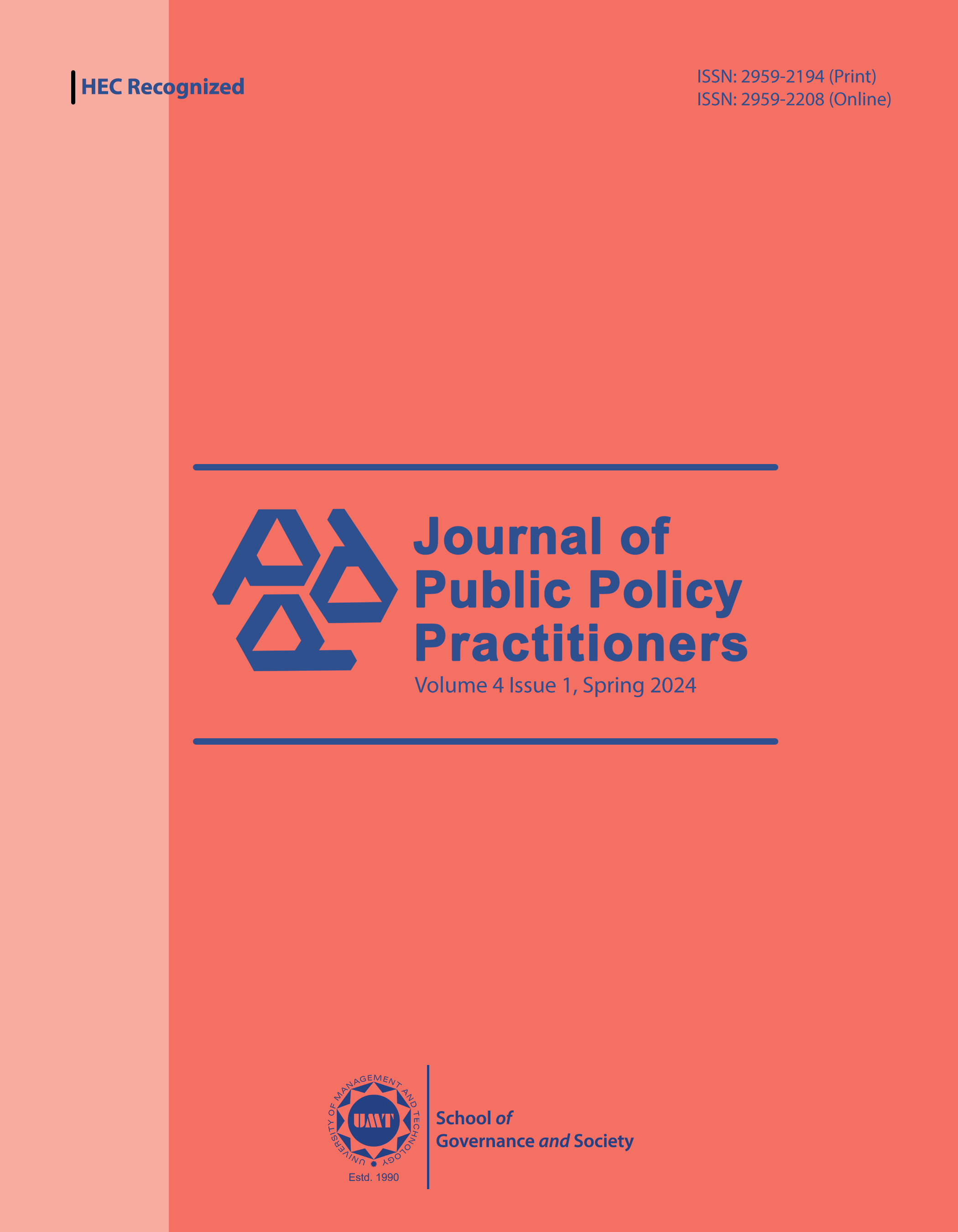How to Broaden the Tax Base of the Excise and Taxation Department in Punjab
Abstract
 Abstract Views: 0
Abstract Views: 0
Broadening the tax base is crucial for ensuring fiscal sustainability in Punjab, where the Excise and Taxation Department manages key levies, including Property Tax, Motor Vehicles Tax, and Professional Tax, which collectively generate over 45% of the department’s total revenue. Despite digitization efforts—such as the computerization of the motor taxation system since 2007 and the property tax system since 2014—Punjab still collects only 40–50% of the potential property tax revenue due to outdated rental values, widespread exemptions, and unassessed units despite technological interventions like self-assessment of property units and imposition of DC rates. For instance, over 1.9 million, which is 30% of total urban property units, remain either under-assessed or exempt, eroding the revenue base by an estimated PKR 50 billion annually. Drawing on governance theory, the study combines recent tax collection trends, focused group discussions, semi-structured interviews with more than 30 key officials belonging to South Punjab, North Punjab and Central Punjab, document analysis. Comparative insights from India and Bangladesh show that digitization and public awareness campaigns can raise compliance by 15–20%, potentially adding billions to Punjab’s revenue. It also highlights how the lack of updated GIS mapping since 2013 has limited tax base expansion by failing to incorporate 15-20% of new properties each year. To address these gaps, the paper recommends strict enforcement of DC rate-based property valuations introduced in 2025, linking GIS with Urban immovable property tax (UIPT) systems to detect untaxed units in real time. Adopting advanced digital platforms for 100% e-payments, especially in remote districts and interdepartmental integration (PRA, PLRA, BoR and Finance), rationalization of exemptions, digital detection of unassessed/underassessed units in circles, zones, districts, division and all over Punjab. The findings emphasize that a broadened tax base could boost Punjab’s own-source revenue significantly, ensuring sustainable growth and better service delivery.
Downloads
References
Ahmad, E. (2024). Political economy of tax and digital transformations in Pakistan. The Pakistan Development Review, 63(2), 135–160. https://doi.org/10.30541/v63i2pp.135-160
Akhtar, N., Safdar, M. A., Baig, K., Ahmad, W., & Khan, A. (2021). Broadening of tax base in Pakistan: Legislative and administrative prospects. International Journal of Innovation, Creativity and Change, 17(2), 1221–1237.
Amin, R. (2024). Social factors influencing tax payment behavior: An empirical study. Pakistan Social Sciences Review, 8(4), 571–598. https://doi.org/10.35484/pssr.2024(8-IV)46
Ammar, A. (2023). Broadening of tax base: Policy Challenges and the way forward. Journal of Public Policy Practitioners, 2(2), 101–115. https://doi.org/10.32350/jppp.22.05
Bukhari, H., & Haq, I. (2020). Tax reforms in Pakistan: Historic and critical review. Pakistan Institute of Development Economics. https://file.pide.org.pk/pdf/Books/Tax-Reforms-in-Pakistan-Historic-and-Critical-View.pdf
Farooq, Z., & Rasheed, M. (2024). Will broadening of the tax base broaden tax revenue base? A case study of Pakistan. https://rasta.pide.org.pk/cgp/will-broadening-of-the-tax-base-broaden-tax-revenue-base-a-case-study-of-pakistan/
Ghaus, A. (1991). An assessment of the property tax revenue potential in Pakistan. Applied Economics Research Centre, University of Karachi.
Hanif, M. (2025). Tax collection in Pakistan: Its challenges and road to improvement.
Hasan, A., Sheikh, N., & Farooq, M. B. (2024). Exploring stakeholder perceptions of tax reform failures and their proposed solutions: A developing country perspective. Meditari Accountancy Research, 32(3), 721–755. https://doi.org/10.1108/MEDAR-03-2023-1961
Jian, Z., & Shah, M. A. (2024). Tax compliance: Rationale and behavioral aspects of taxpayer motives. United Nations Economic and Social Commission for Asia and the Pacific (ESCAP). https://pakistan.un.org/sites/default/files/2025-03/ESCAP-2024-PB-TAX-COMPLIANCE-PB130.pdf
Khan, A. B. (2024). Fiscal challenges and budget FY25. In The state of Pakistan’s economy 2024-25: Tapping the economic potential: Strategies for productivity and growth (pp. 3–15). IBA Press.
Malik, M. B. (2022). Appraisal of comprehensive scheme of increasing tax base proposed by FPCCI. Journal of Public Policy Practitioners, 1(2), 1–32. https://doi.org/10.32350/jppp.12.01
Malik, M. S., Irfan, M., & Munir, S. (2025). Corporate tax avoidance and firm performance: the moderating role of ownership concentration and board independence. Cogent Business & Management, 12(1), Article e2448277. https://doi.org/10.1080/23311975.2024.2448277
Mubeen, M. (2022). Digitization of taxation system: Content analysis of strategic and experts perspective. JISR Management and Social Sciences & Economics, 20(2), 131–142. https://doi.org/10.31384/jisrmsse/2022.20.2.8
Nasseer, S., Sundaram, A., & Younas, Z. (2024). Digitalisation of Pakistan’s tax system: Pathway for enhancing tax efficiency and compliance. International Growth Centre. https://www.theigc.org/sites/default/files/2025-03/Nasseer%20et%20al.%20Final%20Report%20June%202024.pdf
Pasha, H. A., Tanveer, H., & Malik, F. (2025, January 26–27). The tax system of Pakistan and the agenda of tax reforms [Paper presentation]. 5th Rasta Conference, Islamabad, Pakistan.
Saleem, S., Shair, W., Hassan, R., & Iftikhar, R. (2024). Effect of ICT and E-Government on public revenue: Evidence from South Asian Economies. Bulletin of Business and Economics, 13(1), 398–408.
Sarwar, M. N., & Shabbar, S. (2024, September 3–4). Analysis of tax expenditures in Pakistan. [Paper presentation]. 4th Rasta Conference, Islamabad, Pakistan.
Younas, M., Ahmad, S., Khan, A., & Khan, N. (2025). Blockchain-Assisted framework for improving the taxation system of Pakistan. Dialogue Social Science Review, 3(2), 112–139.
Zafar, T., (2017). Taxation system of Pakistan and its impact on Economy. Punjab Portal. https://peri.punjab.gov.pk/system/files/Policy%20Brief%20Feburary%202017.pdf
Copyright (c) 2025 Sobia Malik

This work is licensed under a Creative Commons Attribution 4.0 International License.







